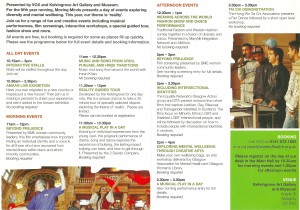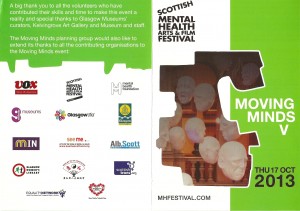On 17th October, I paid a brief visit to the fifth annual ‘Moving Minds’ event at Kelvingrove Art Gallery and Museum. Moving Minds forms part of the annual Scottish Mental Health Arts and Film Festival (SMHAFF), and comprises a day of workshops, seminars and stalls, all with a focus on raising awareness of mental health and mental illness, and tackling stigma through communication and the sharing of information and resources.
SMHAFF is hosted by the Mental Health Foundation, with the support and assistance of various organisations within Scotland, including ‘see me’ Scotland, NHS Health Scotland, Lanarkshire Recovery Network, Voices of Experience (VOX) and the University of Strathclyde. Now in its seventh year, this month-long calendar of events provides a platform for increased awareness of mental illness, challenging stereotypes and misconceptions and the nurturing of mental wellness through a wide range of arts and media, including film-making, music and comedy.
This year’s Moving Minds event, presented by VOX and Kelvingrove Art Gallery and Museum, focused on the theme of ‘reality’. Organisations including the Mental Health Network Greater Glasgow, ‘see me’ Scotland and the Mental Health Foundation were present, with stalls providing literature and sources of further information on topics including the role of exercise, diet and alcohol in mental health, support services and mediation between those with mental health concerns and NHS services, stigma and discrimination, recovery and information and support for LGBT people with mental health conditions.
As well as the presence of stalls and representatives throughout the day, Moving Minds offered workshops and performances including a presentation from women from the black and minority ethnic community on the role of identity and voice in recovery, a Tai Chi demonstration and a 30-minute tour of items in the Kelvingrove Art Gallery and Museum on the theme of ‘reality’. While I was unable to attend the full day of events, the workshops and other sessions certainly appeared to be very well-subscribed, with events by and for the black and minority ethnic community, women and LGBT people demonstrating an encouragingly inclusive approach.
SMHAFF continues to provide an expressive and creative facility for the dissemination of information on mental health through a calendar of empowering and thought-provoking events and activities across Scotland. The availability of stalls with representatives from various organisations and such a wide selection of literature at Moving Minds is, in my view, a very important part of what SMHAFF has to offer. A person with a mental illness can find themselves just about anywhere on an incredibly wide spectrum of extremely challenging symptoms and emotions, and some simply are not in a position where they feel ready to engage with group activities or workshops and, for these people, the ability to approach SMHAFF in a more anonymous and tentative way is essential. Engaging group work and activities are, of course, a great way to share experiences and build confidence, but there is certainly something to be said for the availability of good quality literature and information which can be taken away and digested at leisure. That the organisations involved in SMHAFF and Moving Minds recognise this and allow for the needs of individuals at all stages of the recovery process is a credit to their understanding of mental illness.
I hope that SMHAFF continues to provide interactive stalls, information and literature through Moving Minds as part of future festivals. I also hope that some of the many mental health charities, networks and services which did not have a presence at this year’s Moving Minds will consider hosting stalls at future events. Moving Minds provides an excellent opportunity for mental health organisations to network and share expertise for the benefit of those with mental illness, their friends and families, and should be marked in the calendar of every organisation for which mental health support is a priority.
If you’d like to learn more about the range of activities and events offered by SMHAFF, full details of which organisations are involved, or to subscribe for updates ready for next year’s festival, check out their website. For more on what we GWL volunteers thought of this year’s festival, check out my colleague Kirstie English’s reflections on the 2013 SMHAFF International Film Award Ceremony here.



Comments are closed.